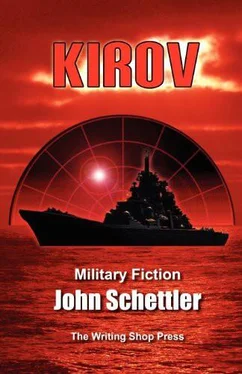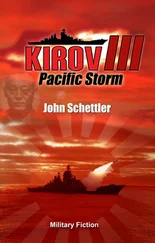John Schettler - Kirov
Здесь есть возможность читать онлайн «John Schettler - Kirov» весь текст электронной книги совершенно бесплатно (целиком полную версию без сокращений). В некоторых случаях можно слушать аудио, скачать через торрент в формате fb2 и присутствует краткое содержание. Жанр: Фантастика и фэнтези, Альтернативная история, на английском языке. Описание произведения, (предисловие) а так же отзывы посетителей доступны на портале библиотеки ЛибКат.
- Название:Kirov
- Автор:
- Жанр:
- Год:неизвестен
- ISBN:нет данных
- Рейтинг книги:5 / 5. Голосов: 1
-
Избранное:Добавить в избранное
- Отзывы:
-
Ваша оценка:
- 100
- 1
- 2
- 3
- 4
- 5
Kirov: краткое содержание, описание и аннотация
Предлагаем к чтению аннотацию, описание, краткое содержание или предисловие (зависит от того, что написал сам автор книги «Kirov»). Если вы не нашли необходимую информацию о книге — напишите в комментариях, мы постараемся отыскать её.
Kirov — читать онлайн бесплатно полную книгу (весь текст) целиком
Ниже представлен текст книги, разбитый по страницам. Система сохранения места последней прочитанной страницы, позволяет с удобством читать онлайн бесплатно книгу «Kirov», без необходимости каждый раз заново искать на чём Вы остановились. Поставьте закладку, и сможете в любой момент перейти на страницу, на которой закончили чтение.
Интервал:
Закладка:
Where Karpov was duplicitous, scheming and often indirect, Orlov was brutally straightforward. He would have made a proper drill sergeant in the army, and would often dress men down with a boisterous harangue when he found them easing off in their duty. He enjoyed throwing his weight around, and his muscle stood him in good stead when it came to matters of discipline. A good hard shove or a slap on the back of the head were par for the course when Orlov got hot, and if a man got him particularly angry things might go far worse.
The men said Orlov’s father had done the same to him, with a hard “spare the rod, spoil the child,” attitude. Orlov made no bones about it, even bragged about it at times. “If my old man had found me doing something like that he would knock some sense into my thick head right off,” he would say. And then he would proceed to knock some sense into a junior midshipman just to illustrate the point. The men feared him more than they respected him. They jumped to order when Orlov growled, but there was no question that the Chief was disliked.
Orlov bullied and cowed every crewman on the ship, save one, the steely sergeant of the marine contingent, Kandemir Troyak, a Siberian Eskimo from the Chukchi peninsula. He was a short, broad shouldered man, very stocky, yet all muscle. When the Chief had first met the man he had tried to impose his will on Troyak as well, bawling out an order with a derisive tone, and berating a member of the marine rifle squad. The Sergeant had taken two quick steps, squaring off to the big Chief and staring him right in the eye. “Sir,” Troyak had hissed out in his low, threatening voice. “Discipline of the marine contingent is the responsibility of the Sergeant Major.” He was so close to the chief that Orlov instinctively took a step back. Troyak was, in fact, the Sergeant Major, and he was letting the Chief know that he would not tolerate his usual brash and strong armed methods where his men were concerned.
“Well, see that it gets done then!” Orlov rejoined, his neck reddening, but the Sergeant simply stood his ground, unmoving, an implacable silence about him that left the Chief feeling most uncomfortable until he dismissed the matter, looking around him quickly to spot a Maintenance Warrant Officer and wave him down as he lugged a tool kit through a hatch.
“Hey, kuda namylilsja? Where are you going with those, you idiot?” Orlov used the incident as cover to extricate himself from the standoff with Troyak, and he never bothered the Sergeant again. When he saw seaman Martok had turned his head from a work bench, noticing the confrontation, he cuffed him hard on the right ear and told him to keep his nose in his work or he would get worse. This was Orlov, a big, brooding, intolerant presence on the ship, quick to lord it over any man junior in the ranks, yet oddly quiet and deferring around senior officers.
Karpov had seen an able confederate in the man, and often foisted off the unpleasant matters of the ship’s discipline on Orlov. So it was no surprise when he handed the Chief Nikolin’s iPod with a disapproving look on his face. “Mister Nikolin can’t hear anything on his radio. Perhaps he is deaf listening to his rock and roll.”
Orlov responded with a sneering smile, and slipped the iPod into his pocket, giving the Communications Officer a hard-faced look.
The Admiral noticed the incident, but overlooked it for the moment, his thoughts elsewhere where he sat in the command chair. The gray ice fog seemed to close in around the ship, isolating it, smothering it, choking off air and life. Leonid Volsky struggled to clear his mind and come to grips with the situation, and soon the claustrophobic feeling he had, drifting slowly forward through the frozen mist, his ship almost blind and deaf, prompted him to act.
“If you gentlemen can keep your heads about you,” he said to his two senior officers, “I’m going to see the doctor. My head is killing me!” He slid off his command chair, and shuffled past Orlov, tapping his pocket. “I’ll take that,” he said quietly, and the chief handed him Nikolin’s iPod. “Let the matter go, Chief,” said Volsky. “The men are a little bewildered at the moment.” He would make it a point to return the device to Nikolin later.
“Very well, sir,” said Orlov, and the Admiral was piped off the bridge as he went below.
Karpov gave Orlov a knowing glance. “Gone to see the wizard,” he said. He was referring to the ship’s chief medical officer, Dmitri Zolkin, a big, warm hearted and amiable man, well suited to his role as physician and psychiatrist aboard Kirov. He was a healer in every respect, and one who knew a man’s psychological health had everything to do with the condition of his body. His remedies were many and varied, and sometimes would include along quiet talk over a cold beer, which might do more to set a man straight than anything he could inject with a needle or force down his throat with a pill.
Zolkin could take a man’s soul right inside him through the portals of those open brown eyes, and give it back to him in the warmest smile anyone had ever seen beneath his ruddy red cheeks. The ship’s crew loved him, and the officers thought of him as a big brother in whom they could confide their deepest troubles. Like a great father confessor priest, he held them all in the palm of his hand, keeping every confidence and dispensing as much wisdom as he did medication from the ship’s infirmary where he held forth with the official ship’s mascot, the gentle green tabby, Gretchko the cat.
When the Admiral arrived at the sick bay two crew members were just leaving the doctor's office, their heads lightly bandaged where they had apparently sustained minor injuries from the blast wave that had recently shaken the ship. They stiffened to attention, saluting the Admiral as he went through the door, then rushed back to their posts, casting a wary glance over their shoulders and wondering what was happening. They had experienced the concussion of the explosion, seen the odd effects in the ocean and sky around them, and although they still stood at action stations, no order to continue the exercises had been forthcoming.
“Leonid,” said the doctor. He had been on a first name basis with the Admiral for years now, ever since they met and became good friends at the naval college, over twenty years ago. Zolkin smiled, his eyes alight, drying his hands on a towel near his first aid station as the Admiral came through the door. “Don't worry about the crew,” he said. “Just a few bumps and bruises here and there; nothing to be concerned about. But what is going on up topside, Admiral? The ship took quite a jolt there. Did we hit a mine?”
“I wish it was something that simple, Dmitri.” It was plain the Admiral was quite distressed. He quickly shared details of the situation with his physician, tipping his head to one side when he had finished, and feeling better already just to have unburdened himself. “It is the strangest situation I have ever encountered. What do you make of it, Dmitri?”
“What you suggest about Orel suffering the same fate as Kursk makes a lot of sense to me, assuming we go by the official story. But this business about Slava is somewhat puzzling, is it not? Neither ship responds to communications hails? Then you will have to conduct a thorough search. Better Slava than Orel. Easier to find a surface ship than a submarine, and also easier to spot any sign of flotsam.”
“We’ve sent the KA-226 out, but they have seen nothing conclusive yet.”
“I see,” said Zolkin. “And the explosion?”
“I am thinking we have lost Orel,” Volsky said heavily.
“An attack?”
“Karpov believed this. I am not so sure.”
“Any deliberate attack would not happen in isolation, Leonid. A surprise attack upon a Russian naval task force would be a major international incident, yes? It would have to have some context to make any sense.”
Читать дальшеИнтервал:
Закладка:
Похожие книги на «Kirov»
Представляем Вашему вниманию похожие книги на «Kirov» списком для выбора. Мы отобрали схожую по названию и смыслу литературу в надежде предоставить читателям больше вариантов отыскать новые, интересные, ещё непрочитанные произведения.
Обсуждение, отзывы о книге «Kirov» и просто собственные мнения читателей. Оставьте ваши комментарии, напишите, что Вы думаете о произведении, его смысле или главных героях. Укажите что конкретно понравилось, а что нет, и почему Вы так считаете.












